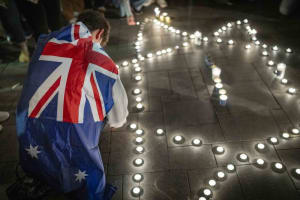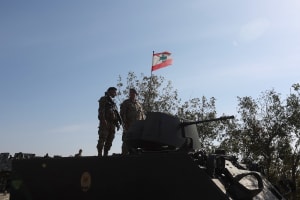3 wrongs the world owes Israel an apology for this Yom Kippur

Yom Kippur calls us to reflect on our wrongdoings and seek repentance. Traditionally, we focus on sins between man and God, and between one person and another. But this year, the question extends further: what about the sins between nations – specifically, the sins the world has committed against Israel?
As Israel fights a war for its very survival – against Hamas and across multiple other fronts – this is not only Israel’s struggle. It is a battle between good and evil, a fight Israel wages on behalf of the entire Western world. And yet, instead of unwavering support, Israel has too often faced condemnation, abandonment, and betrayal.
This Yom Kippur, it is time for the world to atone. The international community owes Israel an apology for three wrongs.
Sin No. 1: Unilateral recognition of a Palestinian state
In the past week, France, Belgium, Luxembourg, Malta, Andorra, the United Kingdom, Canada, Australia, and Portugal announced they now recognize Palestine, bringing the total number of countries that recognize a Palestinian state to 156.
These latest recognitions came from Western countries, including Israeli and American allies. Their justification is that recognition will help end the war and weaken Hamas. In reality, however, unilateral recognition rewards terror.
One of the widely understood reasons Hamas launched its October 7, 2023, massacre was to derail the pending peace agreement between Israel and Saudi Arabia. Hamas sought not only to murder Jews but also to sabotage normalization. For the terror group, there would be no greater victory than gaining legitimacy through recognition of a Palestinian state.
Moreover, even if these countries say the move is to counter Hamas, recognizing a state that the Palestinian Authority president, Mahmoud Abbas, would rule is just as dangerous as legitimizing the terror organization. The Palestinian Authority (PA) has continued its notorious “pay-for-slay” policy, rewarding the families of terrorists who murder Jews. It also persists in promoting antisemitic and anti-Israel rhetoric through its schools, religious institutions, and youth movements – raising yet another generation taught to hate and to kill Israelis and Jews.
The PA is deeply corrupt. As Khaled Abu Toameh wrote in a Jerusalem Center for Security and Foreign Affairs report published even before October 7: “Nearly three decades after its establishment, the Palestinian Authority and its institutions continue unchecked in their corruption and human rights violations. This has negatively impacted the Palestinian public’s confidence in its leadership’s policies and decisions. The ramifications of this on the Palestinian Authority’s leadership have been devastating, especially regarding the peace process with Israel and its ability to lead the Palestinians toward statehood.”
Since then, nothing has improved – if anything, the situation has worsened.
Finally, even the Palestinian people themselves show little interest in a two-state solution.
A poll released last year by the Palestinian Center for Policy and Survey Research (PSR) in Ramallah and the International Program in Conflict Resolution and Mediation at Tel Aviv University found that less than half of Palestinians (40%) support a two-state solution.
Among Jewish Israelis, more than twice as many (42%) favor annexation of the West Bank without equal rights for Palestinians as those who support a two-state solution (21%).
Western countries may declare recognition, but statements do not create a state. Nor do they establish a viable, safe government for the Palestinian people – or eliminate the existential threat of a terror-supporting entity less than 10 miles from Tel Aviv.
Those countries that rushed to recognize “Palestine” after October 7 should be ashamed and apologize.
Sin No. 2: Another year of denial of Israeli women’s suffering
Two years after the October 7 Hamas massacre, it was confirmed that terrorists raped, sexually tortured, and mutilated Israeli women and girls, both during the attacks and in captivity in Gaza.
Most of these women did not survive to speak for themselves. Their bodies bore the evidence. Witnesses, first responders, and survivors who escaped have since provided harrowing testimonies.
There is physical evidence, too: photographs of victims posed in ways that reveal sexual assault; images showing genital injuries; and accounts from therapists treating survivors. Even the United Nations’ Special Representative on Sexual Violence in Conflict, Pramila Patten, issued a report acknowledging that such crimes occurred on October 7.
And yet, the response from much of the international community has been appalling. Women’s groups that claim to champion the fight against sexual violence have been silent, or worse, dismissive. In some cases, atrocities against Israeli women have been denied or justified, all in service of a political agenda against Israel.
Experts warn that ignoring these crimes has consequences.
Silence effectively legitimizes the use of sexual violence as a weapon of war. Hamas and other terror groups, as well as lone actors, may see it as a tactic that can be repeated with impunity.
The danger is not theoretical.
A United Nations report published in August 2024 showed that sexual violence in conflict zones worldwide rose by 25% compared to the previous year, with women and girls making up 92% of victims. From the Central African Republic to Haiti, sexual assault is already a weapon of choice.
To dismiss it in Israel’s case is not only unjust, but it also encourages the spread of one of the most horrific forms of terrorism.
Sin No. 3: Counting Qatar
On September 9, Israel carried out an airstrike in Doha aimed at killing a group of senior Hamas leaders sheltering in Qatar. The strike appears to have fallen short of its primary objective. However, the public reaction that followed was more damaging – especially from the United States.
Insiders, including U.S. Ambassador to Israel Mike Huckabee, have said there is intense behind-the-scenes pressure being applied to Qatar. And during visits and diplomatic exchanges around the time of the strike, some U.S. officials, like Secretary of State Marco Rubio, stressed that Hamas must be dismantled and welcomed steps to go after its leaders. Yet high-profile public gestures of conciliation with Qatar in the days after the attack undermined the deterrent the strike was meant to send. Those signals softened the message that would otherwise have warned other sponsors and safe havens.
Qatar has hosted and funded extremist groups; since October 7, evidence has increasingly suggested that Qatari money and messaging have penetrated institutions from college campuses to political circles – and likely helped shape the global narrative that left Israel exposed and vulnerable to the October assault, and then fueled the anti-Israel backlash after Israel defended itself.
If countries can shelter and bankroll terror while enjoying diplomatic embrace, the incentive structure that enables violence remains intact.
Qatar should be condemned and marginalized; U.S. military posture in the region should be aligned with countries that share core Western values. Embracing Qatar despite these concerns is a grave error, and another wrong the world owes Israel this Yom Kippur.
THE GATES OF REPENTANCE are always open. But on this Yom Kippur, nearly 24 months after Hamas’s heinous attack, there is no better moment to speak up and step forward.
There are countless more wrongs that could be acknowledged, but repentance begins with action. So, perhaps, let us start with these.
.jpg)
Maayan Hoffman is a veteran American-Israeli journalist. She is the Executive Editor of ILTV News and formerly served as News Editor and Deputy CEO of The Jerusalem Post, where she launched the paper’s Christian World portal. She is also a correspondent for The Media Line and host of the Hadassah on Call podcast.
You might also like to read this:

















